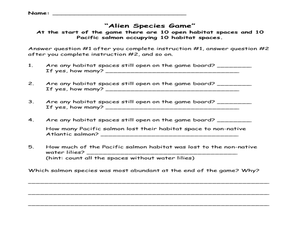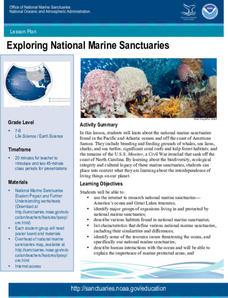Michigan Sea Grant
Sea Lamprey
Learners discuss the types of technology that are used to control the population of sea lamprey in the Great Lakes. They explain the parasite/host relationship and understand the devastating impact invasive species have on ecosystems....
Illinois Department of Natural Resources
Section Two: Why is Biodiversity Important?
Explore soil, genetic traits, natural resources, and pollution in a series of lessons that focus on biodiversity. Kids complete experiments to learn more about the importance of varied genes and organisms in an ecosystem.
Curated OER
National Marine Sanctuaries Fish
Information is provided on Gray's Reef, Florida Keys, and Flower Garden Banks marine sanctuaries. Young marine biologists then visit the FishBase and REEF databases to collect fish species information for each location. They then...
Curated OER
Non Native Species: English Ivy-Landscape Plant or Deadly Killer?
High schoolers study the impact that invasive species have on biodiversity and more natural areas.
Michigan Sea Grant
Fish Habitat and Humans
Strict habitat requirements are needed for the survival of fish populations and fish variety in the Great Lakes. Young scientists become experts in the basic needs of fish and understand how survival necessities can vary with different...
Curated OER
Discover a Pond Food Web
Students study the biodiversity of animal life in a pond. They investigate the interdependence between pond organisms by completing a pond dipping activity and completing a checklist.
Curated OER
Project Wetlands
Learners develop a joint undertaking designed to solve an environmental problem in their local community. They tackle the problem of erosion of banks and chemical run-off into a nearby lake, which is within walking distance of school.
Michigan Sea Grant
Wetlands
Wetlands may not sound particularly ornate, but they are as important as any habitat! With a hands-on activity, young scientists build a wetland model and observe its many functions in action. They discover the importance of wetlands to...
Michigan Sea Grant
Food Chains and Webs
Starting with a simple food chain, young scientists interpret the difference and interrelatedness between herbivores, carnivores and producers. They answer questions related to cause and effect of food chain disruptions, including the...
Curated OER
Forest Ecosystem
Students become familiar with the temperate rainforest. In this forest ecosystem lesson, students identify the producers, consumers and decomposers in the forest ecosystem. Students sort cards and identify the trophic level...
Curated OER
Salmon and the Non-Native Species
Students investigate the affect of non-native species on Pacific Salmon. In this non-native species and Pacific Salmon lesson, students participate in a competition and habitat loss game. They play the game in groups, while answering...
Curated OER
Exploring National Marine Sanctuaries
Students conduct Internet research of the living organisms in national marine sanctuaries, and the resources protected in the sanctuaries. Students gather information about each of the sanctuaries and make an oral presentation and poster...
Curated OER
A Tale of Two Wetlands
Students observe 2 separate wetlands (following downloadable worksheets) and record 10 similarities and 10 differences between them. Then they present their recommendations to the class who roleplay the government's wetland conservation...
University of Utah
University of Utah: Genetic Science Learning Center: Great Salt Lake All Year
Investigate an ecosystem teeming with life, and discover the many bird species who reside at the Great Salt Lake throughout the year.
















